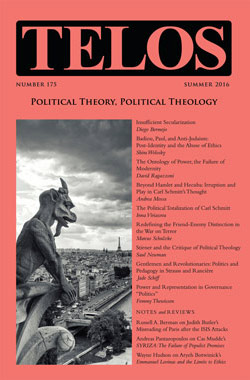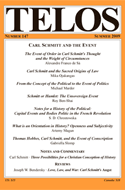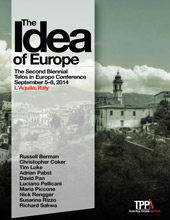By Diego Bermejo · Thursday, July 28, 2016 The process of secularization is insufficient if, voided of its original pathos, it leads to any form of sacralization of the immanence. Secularism becomes insufficient, if not harmful, in the same way as religious fundamentalism, if it becomes an obstacle to building pluralistic coexistence. Therefore, secularism should acknowledge the emergence of religious challenges. Religion has found, in the crisis of reason (metaphysical, scientific, and political), an opportunity not only to be present in the public sphere, but also to demand the right to equal treatment—appealing to the same democratic principles of secularism—and the right to political participation. Secularism cannot respond to these challenges with another form of “enlightened fundamentalism.”
Continue reading →
By Russell A. Berman · Monday, June 13, 2016  Critical theory inherited the mission of philosophy to know the world and to pursue the good life. Careful examination should shed light on the cosmos and our place within it and contribute to a beneficial ordering of human concerns, when wisdom informs governance. Yet that aspiration to know the world encountered the limits of intelligibility, beyond which reason could not proceed. Meanwhile, the efforts to remake the world in the spirit of reason elicited processes of rationalization, as deleterious to the world around us, the natural environment, as to the world within us, the ongoing cultural crisis of modernity and its social corollaries. That is Horkheimer and Adorno’s dialectic of enlightenment at the foundation of the critical theoretical tradition that continues to provide a framework with which to articulate a critique of the contemporary in its many heterogeneous facets: the disruption of all forms of solidarity, the pressures on family structures, the erosion of educational opportunities, the growing gap between rich and poor. Add to this the ominous shifts in the international order, including the breakdown of state structures from North Africa through the Middle East, the strains on the European Union, and the return of a repressive semi-dictatorship in Russia, while—at this point in the presidential election season—the United States seems to be tumbling dangerously toward Weimar conditions. Critical theory inherited the mission of philosophy to know the world and to pursue the good life. Careful examination should shed light on the cosmos and our place within it and contribute to a beneficial ordering of human concerns, when wisdom informs governance. Yet that aspiration to know the world encountered the limits of intelligibility, beyond which reason could not proceed. Meanwhile, the efforts to remake the world in the spirit of reason elicited processes of rationalization, as deleterious to the world around us, the natural environment, as to the world within us, the ongoing cultural crisis of modernity and its social corollaries. That is Horkheimer and Adorno’s dialectic of enlightenment at the foundation of the critical theoretical tradition that continues to provide a framework with which to articulate a critique of the contemporary in its many heterogeneous facets: the disruption of all forms of solidarity, the pressures on family structures, the erosion of educational opportunities, the growing gap between rich and poor. Add to this the ominous shifts in the international order, including the breakdown of state structures from North Africa through the Middle East, the strains on the European Union, and the return of a repressive semi-dictatorship in Russia, while—at this point in the presidential election season—the United States seems to be tumbling dangerously toward Weimar conditions.
Continue reading →
By Alex Dubilet · Friday, December 18, 2015 A miasma of exhaustion and obsolescence pervades Michel Houellebecq’s Submission. It is occasionally punctured by explicit expressions of a pornographic libidinality, but these, in the end, serve only as desperate manifestations of increasingly temporary respites. The end is nigh, if it didn’t already happen. Houellebecq’s universe remains what it has been repeatedly—a universe of male libidinal desire, its intensifying frustrations and anxieties monumentally projected onto the background of the specters of the civilizational decline of the West. Houellebecq is at the tired end of the secular liberal dream of possessive individualism and sexual freedom, or, as the narrator puts it rather succinctly: “In the end, my cock was all I had” (81).
Continue reading →
By Beau Mullen · Tuesday, January 20, 2015  Central to Carl Schmitt’s geophilosophy is his view that law is intrinsically linked to the physical location. This connection between the terra firma and the law is an essential element of what he refers to as nomos. Schmitt sees this as the most authentic form of law, distinguishable from views that perceive law as a normative or positive regime. In his article “Carl Schmitt and the Sacred Origins of Law,” Mika Ojakangas elucidates Schmitt’s conception of nomos, its relation to Schmitt’s view of mythopolitical legitimization of the state, and the consequences of rejecting the notion of such a link by secularization. Central to Carl Schmitt’s geophilosophy is his view that law is intrinsically linked to the physical location. This connection between the terra firma and the law is an essential element of what he refers to as nomos. Schmitt sees this as the most authentic form of law, distinguishable from views that perceive law as a normative or positive regime. In his article “Carl Schmitt and the Sacred Origins of Law,” Mika Ojakangas elucidates Schmitt’s conception of nomos, its relation to Schmitt’s view of mythopolitical legitimization of the state, and the consequences of rejecting the notion of such a link by secularization.
Continue reading →
By Mario Bosincu · Thursday, October 2, 2014 The following paper was presented at the recent Telos in Europe conference on “The Idea of Europe,” held in L’Aquila, Italy, on September 5–8, 2014.
 In a paragraph of Daybreak, Nietzsche spoke of Romanticism’s “great reaction”[1] to the Enlightenment. Zeev Sternhell has brought out two distinctive elements of this centuries-long European revolt against the “rationalist modernity”:[2] the rejection of the claim to “mold people’s lives” by means of enlightened reason, and the reevaluation of faith as “an essential foundation of society”[3] accompanied by the idealization of the spiritually united medieval civilization as contrasted with the atomized modern society in the grip of decadence. This current of thought was the symptom of the crisis of the pre-Enlightenment traditional societies, described by Professor Pellicani as closed, static, rigidly prescriptive cultural universes in which, to cite Jaspers, “everything is under the control of symbols of being, held fast in unquestioned orders.”[4] The anti-Enlightenment movement aimed precisely at refounding these collapsed civilizations. One thinks of Novalis’s picture of medieval Europe pacified by the all-binding force of Christendom embodied by the clergy exercising a pastoral power in order to reshape men into salvation-worthy subjects. In a paragraph of Daybreak, Nietzsche spoke of Romanticism’s “great reaction”[1] to the Enlightenment. Zeev Sternhell has brought out two distinctive elements of this centuries-long European revolt against the “rationalist modernity”:[2] the rejection of the claim to “mold people’s lives” by means of enlightened reason, and the reevaluation of faith as “an essential foundation of society”[3] accompanied by the idealization of the spiritually united medieval civilization as contrasted with the atomized modern society in the grip of decadence. This current of thought was the symptom of the crisis of the pre-Enlightenment traditional societies, described by Professor Pellicani as closed, static, rigidly prescriptive cultural universes in which, to cite Jaspers, “everything is under the control of symbols of being, held fast in unquestioned orders.”[4] The anti-Enlightenment movement aimed precisely at refounding these collapsed civilizations. One thinks of Novalis’s picture of medieval Europe pacified by the all-binding force of Christendom embodied by the clergy exercising a pastoral power in order to reshape men into salvation-worthy subjects.
Continue reading →
By John Milbank and Adrian Pabst · Thursday, August 14, 2014 We agree with Joshua Ralston that all forms of religious fundamentalism demand both universal and unconditional condemnation as well as regional and global responses to help all the victims—irrespective of their faith. We also agree with him that it is wrong to judge age-old religious traditions by modern secular, liberal standards and that essentialized notions distort complex cultural and historical realities.
Continue reading →
|
|

 Central to Carl Schmitt’s geophilosophy is his view that law is intrinsically linked to the physical location. This connection between the terra firma and the law is an essential element of what he refers to as nomos. Schmitt sees this as the most authentic form of law, distinguishable from views that perceive law as a normative or positive regime. In his article “Carl Schmitt and the Sacred Origins of Law,” Mika Ojakangas elucidates Schmitt’s conception of nomos, its relation to Schmitt’s view of mythopolitical legitimization of the state, and the consequences of rejecting the notion of such a link by secularization.
Central to Carl Schmitt’s geophilosophy is his view that law is intrinsically linked to the physical location. This connection between the terra firma and the law is an essential element of what he refers to as nomos. Schmitt sees this as the most authentic form of law, distinguishable from views that perceive law as a normative or positive regime. In his article “Carl Schmitt and the Sacred Origins of Law,” Mika Ojakangas elucidates Schmitt’s conception of nomos, its relation to Schmitt’s view of mythopolitical legitimization of the state, and the consequences of rejecting the notion of such a link by secularization.  In a paragraph of Daybreak, Nietzsche spoke of Romanticism’s “great reaction”[1] to the Enlightenment. Zeev Sternhell has brought out two distinctive elements of this centuries-long European revolt against the “rationalist modernity”:[2] the rejection of the claim to “mold people’s lives” by means of enlightened reason, and the reevaluation of faith as “an essential foundation of society”[3] accompanied by the idealization of the spiritually united medieval civilization as contrasted with the atomized modern society in the grip of decadence. This current of thought was the symptom of the crisis of the pre-Enlightenment traditional societies, described by Professor Pellicani as closed, static, rigidly prescriptive cultural universes in which, to cite Jaspers, “everything is under the control of symbols of being, held fast in unquestioned orders.”[4] The anti-Enlightenment movement aimed precisely at refounding these collapsed civilizations. One thinks of Novalis’s picture of medieval Europe pacified by the all-binding force of Christendom embodied by the clergy exercising a pastoral power in order to reshape men into salvation-worthy subjects.
In a paragraph of Daybreak, Nietzsche spoke of Romanticism’s “great reaction”[1] to the Enlightenment. Zeev Sternhell has brought out two distinctive elements of this centuries-long European revolt against the “rationalist modernity”:[2] the rejection of the claim to “mold people’s lives” by means of enlightened reason, and the reevaluation of faith as “an essential foundation of society”[3] accompanied by the idealization of the spiritually united medieval civilization as contrasted with the atomized modern society in the grip of decadence. This current of thought was the symptom of the crisis of the pre-Enlightenment traditional societies, described by Professor Pellicani as closed, static, rigidly prescriptive cultural universes in which, to cite Jaspers, “everything is under the control of symbols of being, held fast in unquestioned orders.”[4] The anti-Enlightenment movement aimed precisely at refounding these collapsed civilizations. One thinks of Novalis’s picture of medieval Europe pacified by the all-binding force of Christendom embodied by the clergy exercising a pastoral power in order to reshape men into salvation-worthy subjects. 






